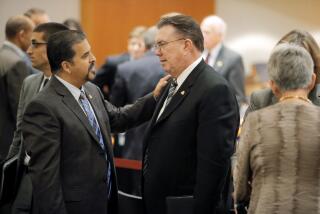Restraint on Prayers Violates Freedom
- Share via
Turmoil has arisen in the media regarding a letter sent by Tustin Mayor Richard B. Edgar to clergymen stating, “however, in the future we are required to ask that all speakers refrain from using language that might be construed as endorsing a particular religious belief.”
Or as Tustin City Atty. Jim Rourke says: “Speaking about Jesus Christ is obviously identifying a particular religion. . . . Clergy should not identify any particular religion.” This is the heart of the dilemma. Mayor Edgar writes: “The interpretation of what I said has been misconstrued to say that Jesus Christ could not be mentioned. I did not write that.” To the contrary, the interpretation has not been “misconstrued.”
His city attorney emphatically states a court decision in which a clergyman was told to remove all references to Christ. While Mayor Edgar cleverly sidesteps the issue to avoid controversy, Rourke plays devil’s advocate.
During November, Rourke billed the city of Tustin only $40,955.13 for one month of legal services. Then be began writing his “prayer memorandums” to harass local clergy. Isn’t it interesting how this explosive religious issue has become a time-consuming legal issue? When are Tustin citizens going to wake up and hold their public officials accountable?
By definition, invocation is prayer to a God or deity. In 1962, the U.S. Supreme Court ruled that the state cannot determine the content of any prayer. No U.S. Supreme Court ruling has ever held that the use of the words Christ, Jesus, or Jesus Christ during an invocation at any legislative session is a violation of the First Amendment establishment clause.
Rourke’s restraint on “the language by which clergy pray to God” is censorship and prior restraint of religious freedom protected by the First Amendment.
Now you understand why we chanted “Remove Rourke.”
FRANK KAZERSKI
Tustin
More to Read
Sign up for Essential California
The most important California stories and recommendations in your inbox every morning.
You may occasionally receive promotional content from the Los Angeles Times.










